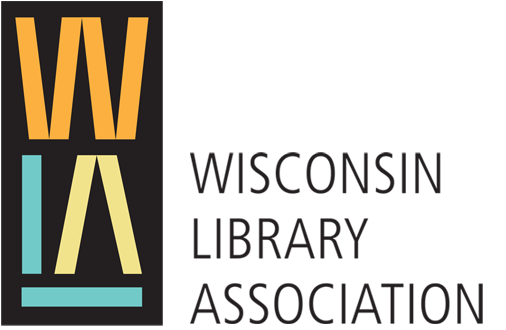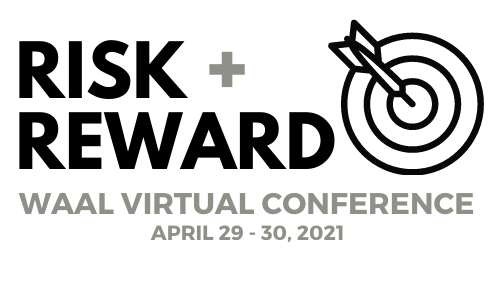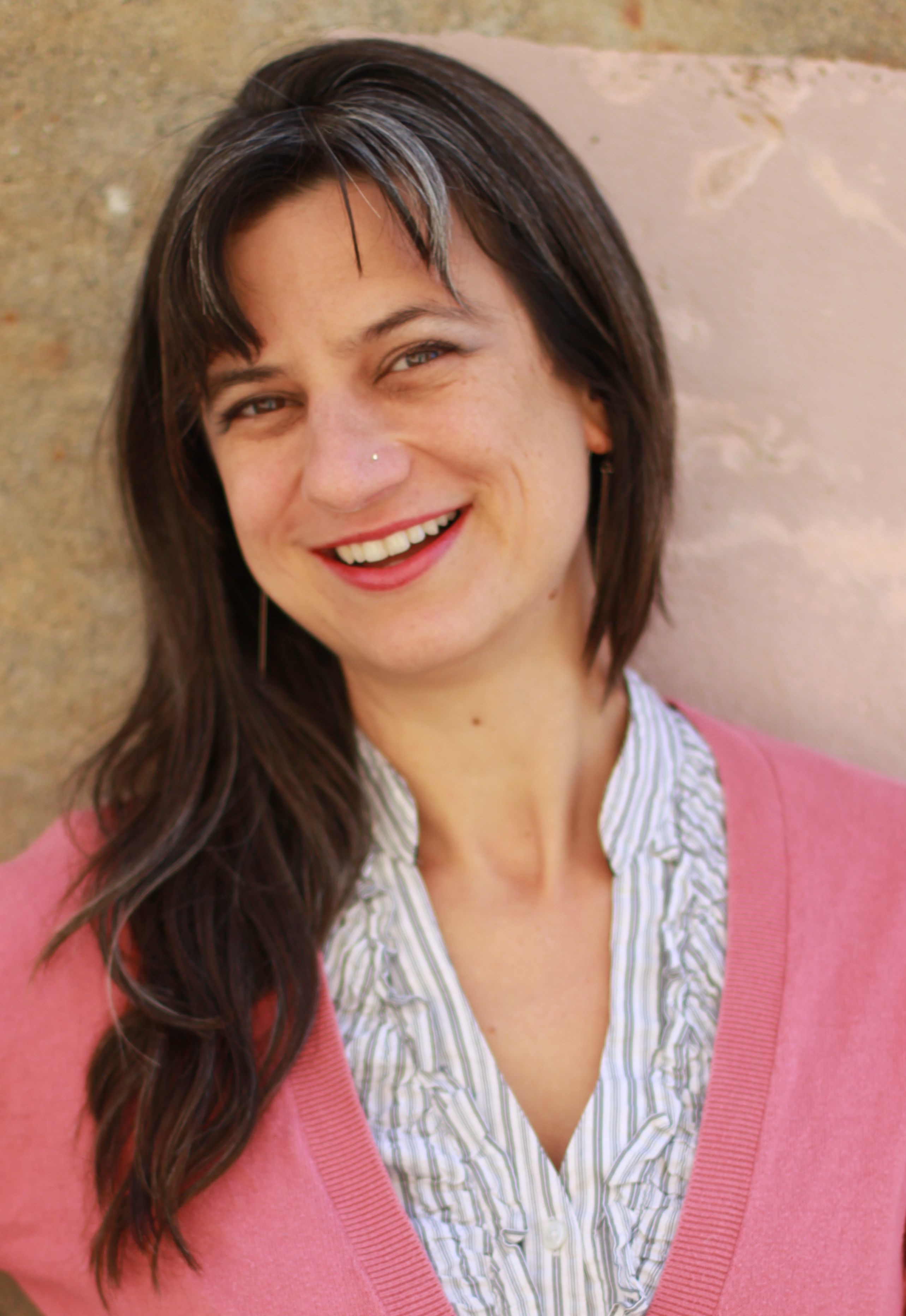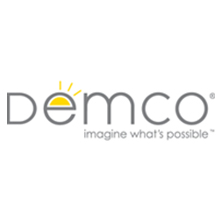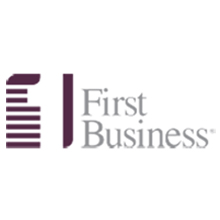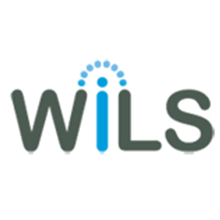- HOME
- ABOUT US
- JOIN
- ADVOCACY
- PROGRAMS/EVENTS
- AWARDS
- UNITS
- Divisions
- Sections
- Roundtables
- Special Interest Groups
- Committees
- FOR MEMBERS
- FOUNDATION
WAAL ANNUAL CONFERENCE 2021
Conference Committee
|
|
THURSDAY PROGRAMS |
THURSDAY PROGRAMS
|
8:15 - 8:30 |
|
|
8:30 - 9:45 |
|
|
10:00 - 10:45 |
|
|
11:00 - 11:45 |
|
|
11:45 - 1:00 |
|
|
1:00 - 1:45 |
Welcome: 8:15-8:30
Maureen Olle-LaJoie, WAAL Board President, will begin the WAAL 2021 Annual Conference with opening remarks.
Keynote Address: 8:30-9:45
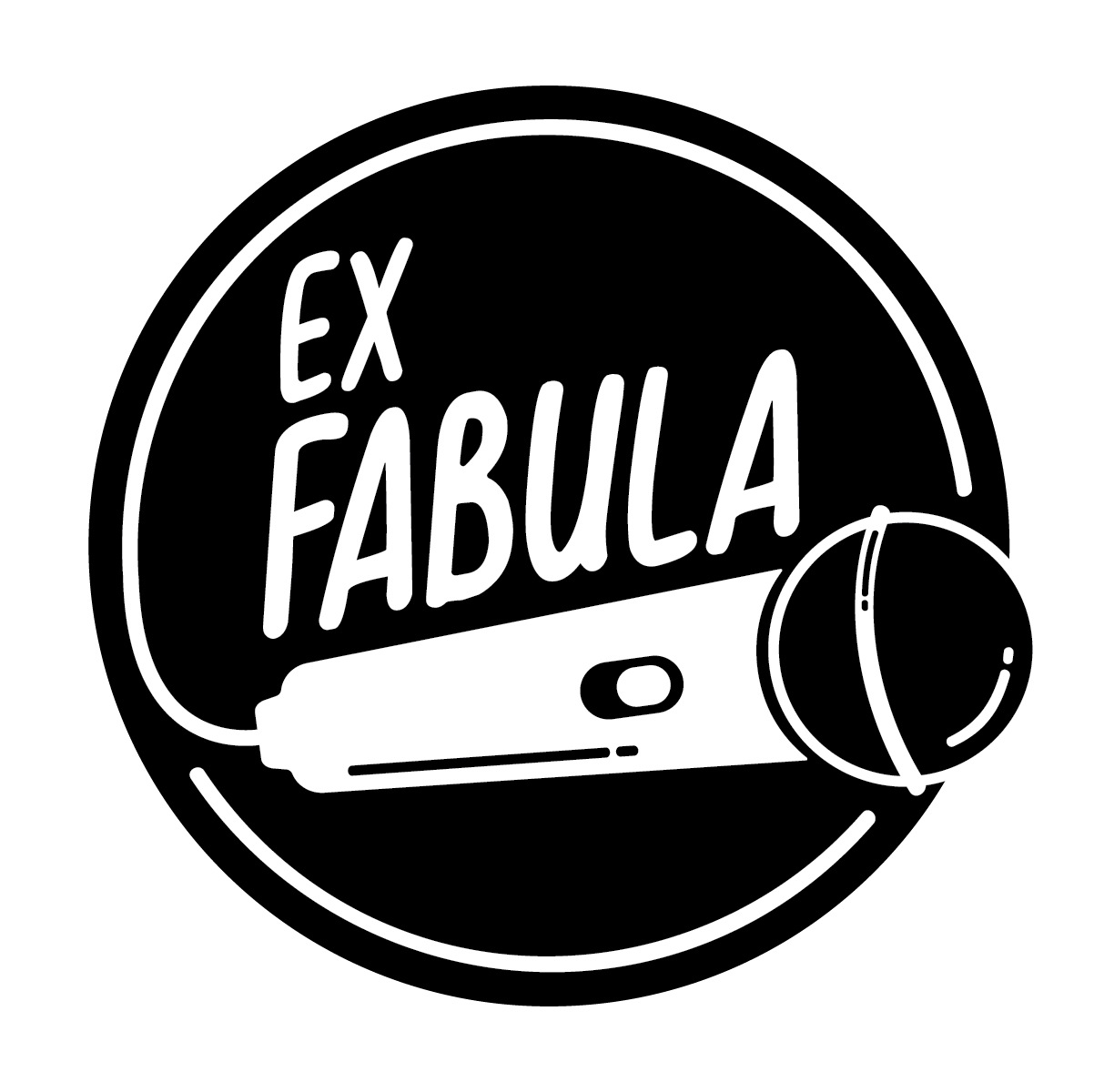 Taking Risks:
Taking Risks:
Connecting Through Real Stories
Megan McGee, Co-founder & Executive Director of Ex Fabula
True, personal stories are powerful tools for building relationships, sharing knowledge, and even demonstrating the impact of academic libraries. Ex Fabula is a nonprofit with the mission of connecting Milwaukee through real stories, and in this talk,
Executive Director Megan McGee will share applied storytelling tactics and examples. She’ll also highlight how risk, power, and vulnerability are at play – and how those should be considered when engaging students, administrators, faculty, and campus leaders.
Breakout Sessions
Session 1: 10:00-10:45
What Would That Look Like Here? Adapting Instruction Ideas for Your Campus
Elaine Gustafson, Concordia University
Websites, books, online groups, and open access resources are filled with information literacy instruction ideas. However, they are often suited to a specific curriculum, time limit, instruction space, technology, and/or campus culture. In this workshop, participants will practice adapting a sample lesson, game, or learning activity from Project CORA, the Community of Online Research Assignments, through a scaffolded learning experience.
Break Out of Your K-12 Outreach Routine
Shauna Edson, University of Wisconsin-Parkside
Liz Antaramian, University of Wisconsin-Parkside
Xou Le Vang, University of Wisconsin-Parkside
Academic libraries have a responsibility to build relationships with K-12 classrooms in our communities but, with a small outreach staff, it can be difficult to begin. Working with younger students may be outside the comfort zone of academic library staff but it’s important to establish firm guidelines, have good communication and. . .expect the unexpected! We’ll share how we’ve managed to collaborate with various K-12 groups by building context into our activities and utilizing constructivist learning techniques, such as modeling, coaching, scaffolding, and exploration. Participants will learn from our K-12 programming experiences and leave with tips on classroom management, technical support and crossing the finish line together.
Session 2: 11:00-11:45
Primary Source Literacy in the Online Classroom
Abigail Nye, University of Wisconsin-Milwaukee
Max Yela, University of Wisconsin-Milwaukee
Georgia Brown, University of Wisconsin-Milwaukee
The participants will present three case studies that explore how archivists and librarians from UWM’s Archives, Special Collections, and American Geographic Society Library worked with instructors to incorporate primary source literacy instruction into different learning modalities. The case studies will address how archivists and librarians employed Canvas learning objects, story maps, synchronous engagement, and other strategies to guide students toward key Primary Source Literacy learning outcomes.
Collaborations with Campus and Community Stakeholders
Tiffany Thornton, University of Wisconsin-Milwaukee
Carrie Wade, University of Wisconsin-Milwaukee
Heidi Anoszko, University of Wisconsin-Milwaukee
How can librarians enact change with social justice issues of impact to their Campus and local community? As part of the UWM Golda Meir Library, the Diversity Advisory committee and its members have continually worked to accomplish this goal. We seek to encourage an educational environment that is supportive of all library users through our outreach work and programming to address issues of Equity, Diversity, and Inclusion (EDI). Through our efforts, we’ve developed successful collaborations with University Campus partners (e.g., Fostering Success Welcome Bag Drive and Meet Your Campus Partner Brown Bag Series), as well as local community groups aligning with our mission (e.g., Wisconsin Books for Prisoners Donation). This presentation will discuss the process for developing these initiatives, lessons learned through challenges, and strategies to engage and establish buy-in with various library stakeholders. In addition, there will be time for a hands-on group activity and opportunities to learn from each other’s efforts and ideas for developing Equity, Diversity, and Inclusion (EDI) centered programming within your libraries.
Lunch Break: 11:45-1:00
WAAL Annual Member Meeting: 12:00-12:30
Maureen Olle-LaJoie, University of Wisconsin-River Falls
WAAL Board President Maureen Olle-LaJoie will lead WAAL’s annual Membership Meeting during Thursday’s lunch break. After agenda items are addressed, this time will also be available for WAAL members to provide feedback related to WAAL or the conference.
Breakout Sessions
Session 3: 1:00-1:45
Risky Writing: Ditching the Research Paper and Reaping the Rewards of More Authentic Assignments
Nicole Bungert, University of Wisconsin-Milwaukee
Kate Ganski, University of Wisconsin-Milwaukee
Kristin Woodward, University of Wisconsin-Milwaukee
This presentation is about the dreaded research paper. Why has this genre persisted despite mutual hatred by both instructors and students? Why, despite changes in writing technologies and how we access information, do we still ask students to research a topic and tell us what they find out? Drawing on our 15+ years assisting students who are researching for their research papers and our more recent experiences working with composition faculty on alternative writing assignments, we will interrogate why faculty assign the academic essay and how alternatives might better meet their learning goals. After our presentation, we will share a short list of alternative writing assignments and invite further discussion on the viability of each, giving attention to the role of librarians to support information literacy objectives. We will distribute feedback after the conference as a resource for attendees as well as for those who were not able to attend but are interested in alternative writing assignments.
It Slices, It Dices, It Juliennes: The Multiple Uses of Faculty Publication Data
Mitchell Scott, St. Norbert College
Sarah Titus, St. Norbert College
Alaina Morales, St. Norbert College
How far can one piece of data go? During this session St. Norbert College (SNC) will detail the multiple ways that they are using faculty publication data to promote faculty work, library collections and library services. These projects include the creation and maintenance of a digital faculty scholarship display in the library, a library service that identifies Green Open Access rights of St. Norbert authors and deposits permissible versions of faculty research in the SNC Digital Commons, and a social media campaign congratulating faculty scholars on recent publications. Join us to learn more about how SNC harvests faculty author data, how the digital faculty scholarship exhibit was built and is maintained, our process for Green OA deposits, and using social platforms to connect the library and library users to faculty work.
Swim Lanes and Superpowers: Engaging Student Employees
Erica Grunseth, University of Wisconsin-Green Bay
In fall 2018, the Cofrin Library hired more than a third of the Public Services student staff. Training was 8 staff-intense weeks; creating process, workload, and engagement problems. We needed to keep our student staff engaged and invested in their work while providing great services and training new arrivals. We found ways to reduce training time and engage student employees by discovering and developing skills that are valuable to them. We used a post-training discussion about superpowers and a Lean swimlane tool. This tool helps create efficiencies of workflow, involving everyone in the process. We invite our students to engage in the training process and express how it builds skills for their future careers so we can help them engage in their work and future.
FRIDAY PROGRAMS
|
8:45-9:00 |
|
|
9:00-9:45 |
|
|
10:00-10:45 |
|
|
11:00-12:00 |
|
|
12:00-12:05 |
|
|
12:05-12:30 |
Welcome: 8:15 - 8:30
WAAL Conference Chairs, Elisabeth Kaune and Kate Otto, will share welcoming remarks for the WAAL 2021 Annual Conference’s second day.
Breakout Sessions
Session 4: 9:00-9:45
Lessons Learned: Getting the Most Out of Library School
Katelyn Sabelko, Briar Cliff University in Sioux City, IA
Attention all present, future, and past library school students: Curious to hear a current take on getting the most out of library school? This presentation will focus on the experiences I found most valuable in graduate school, the risks I’ve taken that have paid off, and some lessons I’ve learned the hard way. If you’re a current or future student, you’ll leave the session with ideas on where to focus your energy during library school. If you’re an LIS professional, you’ll leave with insight into how you can support emerging professionals. Come ready to engage in (friendly, honest, empathetic) discussion! I want to hear what you’ve learned, too.
Re-Imagining the Undergraduate Research Award
Raina Bloom, University of Wisconsin-Madison
Jessica Newman, University of Wisconsin-Madison
The Undergraduate Research Award Committee at the University of Wisconsin-Madison has transformed our longstanding Undergraduate Research Award, significantly increasing its reach and impact. The previous award reached a targeted group of students at the end of their research process. We received few applications, and, due to lack of guidance, the applicants often hadn’t had appropriate, sustained contact with library resources and staff. Our goal was to create a new award structure that reached students across campus and integrated financial support and librarian involvement early in the students’ research process.
Session 5: 10:00-10:45
A Risk-free Introduction to Open Textbooks
Kristin Woodward, University of Wisconsin-Milwaukee
For a small initial investment in time and attention, participants will learn best practices for identifying open textbooks that align with course learning goals. But wait-- that’s not all! For the same low price, we will reward participants with strategies for getting the open textbook conversation started on their campus. Still not convinced? We’ll also throw in, for the same low introductory price, stories of successful UW Milwaukee open textbook adoptions you can use as models on your campus!
Ready, Set, Engage! Making the Library a Center for Civic Participation on Campus
Shauna Edson, University of Wisconsin-Parkside
Molly Susan Mathias, UWM Libraries – Daniel M. Soref Learning Commons
Libraries are uniquely positioned as hubs for civic engagement. While some in our communities might argue that libraries should remain neutral and avoid talk of politics, libraries at UW-Parkside and UW-Milwaukee have embraced civic engagement as a vital form of outreach. In this presentation, we will talk how libraries get out the vote through voter education, National Voter Registration Day, and other voter support. Going beyond voting, we will share some of UW-Milwaukee's strategic social justice initiatives and awareness campaigns. And we will provide an overview of community-based learning projects at UW-Parkside, and how the library is documenting and archiving its connections with the community.
Extending Digital Collections for Teaching & Research
Ann Hanlon, University of Wisconsin-Milwaukee
Jie Chen, University of Wisconsin-Milwaukee
Michael Doylen, University of Wisconsin-Milwaukee
The UWM Libraries Digital Collections include over 170,000 freely available digitized archival sources in over sixty different collections. These unique digital collections are valuable resources, both for the classroom and for research. With nearly two million pageviews a year, we know people are finding our collections. But students and researchers alike need more than discovery tools to effectively put this rich resource to work. In this presentation, we will discuss how we are working to extend those collections using low-barrier-to-entry digital tools that enable faculty and students to work with, understand, and transform digitized primary sources in new ways. Through the UWM Libraries Digital Humanities Lab, we have gained valuable insights from two Fellows programs - the Digital Humanities Teaching Fellows, now in its second year; and the UWM Center for Latin American and Caribbean Studies (CLACS)-DH Fellow program. We'll explore how the Fellows have informed extending our digital collections, highlighting the "toolkit" that is emerging from those discussions. One example we’ll discuss is StoryMapJS, a free application designed to tell place-based stories using maps, images, sound, and video. We will discuss its use in the classroom using our March on Milwaukee Civil Rights collection and other sources, as well as how we have extended the tool's functionality by customizing a “canned” version for the CLACS Fellow that can be viewed in no-or-low-network-connection areas of Cuba. Because these tools (and collections) are free and open, we anticipate that the methods we demonstrate can be adopted by nearly any Library.
Lightning Talks: 11:00-12:00
The Risks and Rewards of Using an iPad for Hourly Headcounts
Scott Pfitzinger, University of Wisconsin-La Crosse
It has been 3 years since Murphy Library began using a free iPad app for doing the hourly counts of people in the building instead of just using a clicker. This has allowed librarians to collect data and trends regarding the use of specific sections of the library by hours of the day. This talk will present the data that library staff has been able to gather and discuss the problems and benefits they have encountered.
The Risk of a Student Worker Schedule Draft Day
Debbie Brezovar, Library Operations Supervisor, Carroll University
After experiencing many weeks of setting-up and revising student worker schedules before each semester, and then seeing a high number of absenteeism throughout the school year, library staff developed a new scheduling system to put the focus on student engagement and accountability. Similar to the sporting world, we implemented a Draft Day. This Lightning Talk will explain the steps needed to set up your own Student Worker Schedule Draft, the benefits for both supervisors and students, and some lessons learned along the way.
The Streaming Video Rocket Sled to Hell: How We Survived the Ride
Pam Cipkowski, Collection Development Librarian, University of Wisconsin-La Crosse
Rebecca Strandlie, Library Services Assistant, University of Wisconsin-La Crosse
When the UW-La Crosse campus switched to online learning last spring during the COVID pandemic, demand for streaming video increased exponentially, and librarians embarked on a wild ride of non stop streaming video requests. To keep all these requests from careening off track, staff developed an online tool to track the status of all film requests, in progress orders, video package deals, expenditure data, and more. Pam and Rebecca will share how they put this tool together, as well as the risks they took and the rewards reaped along the way. With the demand for streaming video not likely to slow down, they will show how they are poised to take control of the streaming video rocket sled as it hurtles into the future.
Understanding Information Privilege in the Time of COVID-19
Aubrey Huff, Undergraduate Support and Outreach Librarian, University of Wisconsin-Stout
Information privilege, or the idea that access to information can be based on an individual's status, affiliation, or power, is a growing issue among information seekers. While it impacts multiple aspects of the seeking process, information privilege remains largely out of focus in the academic community. When COVID-19 caused much of the country to shut down, including academic institutions, libraries, and other information hubs, awareness of information privilege became a cruel reality to many Wisconsinites who suddenly lost their access to essential resources. This session will examine proactive ways in which libraries can address the issue of information privilege to better serve their patrons.
Raving about WAVE
Val Magno, Fox Valley Technical College
In this talk, Val will discuss using the WAVE tool from wave.webaim.org as a minimum standard for library websites and vendor products. We all have to start somewhere, and WAVE catches the easy stuff like missing text for images. It also provides easy feedback for improving the vendor's product to meet the needs of a varied audience.
Using Visual Literacy Skills to Identify Fake News
Christine Rickabaugh, Graduate Student, University of Wisconsin-Milwaukee
Visual literacy is becoming a "must-have” tool in today’s business, academic, and technological world. In this presentation, attendees will be offered an overview of visual literacy basics and their importance in understanding contextual clues often embedded in images. Attendees will learn how teaching visual literacy skills to higher education students can increase their ability to distinguish between authoritative news stories and disinformation. Visual literacy is a vital skill for media consumers of any age, as most of us get at least some of our news online. A toolkit of resources, ideas and information for current and future use will be shared.
Accessible Accessibility: The Far-reaching Rewards of Connecting to the University’s Mission through LibGuide Accessibility
Jessica Rardin, User Services Intern, University of Wisconsin-Milwaukee
Accessible LibGuides are integral to the University of Wisconsin-Milwaukee Libraries’ focus on diversity, equity, and inclusion and creating an outstanding learning environment for students. As a User Services MLIS student intern, Jessica advocated to the Instructional Design Librarian to create a guide that could be used to improve the consistency and usability of UWM Libraries' LibGuides, and, in Fall 2020, she completed work on a LibGuide focused on web accessibility. The Accessibility Tutorial and Self- Assessment is a training tool for incoming staff members, interns, and librarians who want to freshen-up their LibGuides and a heuristic for staff to intentionally assess the accessibility of the online learning content they create. As a reference tool and learning artifact, the checklist reminds librarians that they do not need to be an accessibility expert to create or implement accessible design.
A Case for Inclusive Brainstorming Sessions
Leatha Miles-Edmonson, Research and Instruction Librarian, Marquette University
Claire Dinkelman, Research and Instruction Librarian, Marquette University
In introductory level information literacy sessions, librarians conducted a brainstorming activity to build a search term. In one scenario, students view a stock photo of women of color at a conference table. Students provide 3-4 words that describe the photo; typically, the librarian discusses how the student suggestion of “teamwork” is related to “collaboration.” The librarian outlines how using multiple terms widens your pool of results as researchers use different terms for similar concepts. While running this activity with a diverse group, the suggestions were surprising, students offered different terms: “Black girl magic,” “black women,” and “women of color.” These words had not previously been suggested. Learn how this experience was incorporated into future information literacy sessions to now touch on new topic ideas like researcher identity. Learn what made this session such an interesting learning opportunity for students and librarians.
Poster Session: Recordings
Open RN: Open Resources for Nursing
Vince Mussehl, Library Director, Chippewa Valley Technical College
Nic Ashman, Librarian, Chippewa Valley Technical College
In the spring of 2019, Chippewa Valley Technical College (CVTC) was awarded a $2.5 million grant as part of the U.S. Department of Education’s Open Textbooks Pilot grant program. The grant, Open Resources for Nursing, or Open RN, is allowing us to create a more affordable experience for students enrolled in nursing courses by developing open nursing textbooks and related virtual reality scenarios. Visit our poster to learn more about where we are at with our project, hear some of our challenges, and discover more about how we are making nursing education more innovative and affordable for students. Stop by to see how you can get involved!
VIEW NOW
WLA Mentoring Program
Kati Schaller, Wisconsin Library Association Leadership Committee
Stop by this poster to learn more about the brand new WLA Mentorship Program! The WLA Mentorship Program, a free program for WLA members, is designed to provide encouragement, support, and guidance to library staff seeking professional growth through connections with experienced colleagues within a structured mentoring program. Mentees gain experience from knowledgeable library colleagues while becoming further involved in the statewide professional association. Mentors gain opportunities to give back to the profession, model volunteerism, and help influence the future of librarianship.
VIEW NOW
Create or Curate: An Environmental Scan of Digital Learning Object Development
Eric Kowalik, Instructional Designer, Marquette University
Heather James, Associate Dean of Scholarly Resources, Gonzaga University
Elizabeth Gibes, Parent Involvement Coordinator, Highland Community School
A 2012 survey focused on the sharing of information literacy teaching materials found that current practice amongst many librarians creating digital resources is to find existing learning materials before developing their own. This survey sought to examine whether this continues to be true for librarians creating or reusing Digital Learning Objects (DLOs) and what best practices regarding design and development of DLOs were being used. The survey was distributed via listservs focused on information literacy and library information technology without targeting any type of institution, program, or discipline. Follow-up interviews were conducted with six volunteer participants in order to learn more about specific cases and institutional contexts.
VIEW NOW
The Impact of Digital Humanities in Cataloging Sudanese Digital Poetics
Israa Abbas, Graduate Student, University of Wisconsin-Milwaukee
The Sudanese community circumvents the issue of lack of freedom of speech with poetry. This historically significant mode became an important element of the recent revolution. Scholars argue that lyric poetry is a form of freedom, an escape for writers, and a form of engagement with social/political issues. Unfortunately, Sudanese literature is not well represented in American libraries compared to Eurocentric poetry. Scholars suggest that technology and literature, digital humanities, help us understand the concept of modern digital culture. This project identifies the importance of the expansion of awareness of Sudanese poetry in a digital form and how this elevates awareness of freedom of speech needed in Sudan. This archival project is crucial to diversify the libraries in America, by also bringing awareness to Sudanese literature and social issues.
VIEW NOW
Exploring LatinX History in Milwaukee: An Embedded Librarianship Experiment and Digital Scholarship Collaboration
Mary Frenn, Research and Instructional Services Librarian, Marquette University
Taylor Ralph, Acquisitions & Liaison Librarian, Marquette University
For three years, Marquette University Research & Instruction librarians have been embedded in a unique history course on American immigration specific to Wisconsin’s Latinx community. In collaboration with local middle school students, Marquette graduate and undergraduate students conduct in-depth research to create a digital presentation summarizing their findings. Throughout the experience, students work with various experts including MU History faculty, middle and high school staff, MU’s Digital Scholarship Lab, and the MU librarians who coordinate spaces, technologies, and information literacy sessions for students of various ages and skill levels. This poster will discuss the ideas librarians have implemented and experimented with throughout this innovative partnership, as well as describe the rewarding products and meaningful relationships that have formed as a result.
VIEW NOW
Collection Management Using Research Output: Small Risk with a High Reward
Alissa Fial, Research and Instructional Services Librarian, Marquette University
Library budgets and collection management have always been a balancing act for libraries. Journals get bundled, and costs continue at an astronomical rise. Taking risks on collection management decisions is not encouraged, and there is little reward. When difficult decisions need to be made, librarians take into consideration the needs of patrons and the library budget. While we cannot make everyone happy all the time, we can use specific methods in collection decision-making. This poster will demonstrate how using the database, Web of Science, allows for further data in the collection management process. The poster will showcase two processes: (1) reviewing publications where the faculty manuscripts were selected; and (2) reviewing the reference lists from those publications. Finally, the poster will demonstrate how the information gained was used in collection management decision making.
VIEW NOW
Cultural Competence in Library Instruction: How to Teach the Teachers
Eric Ely, Graduate Student, University of Wisconsin-Milwaukee
As institutions of higher education in the United States become increasingly diverse, academic librarians must continually strive toward cultural competence. Academic libraries, as sites of teaching and learning – considered broadly to include engagement beyond traditional library and information literacy instruction – provide frequent opportunities for academic librarians to engage with students. While most applicable to traditional library instruction, considering the more frequent and informal interactions between librarians and students puts an increased emphasis on the need for academic librarians to serve students in culturally appropriate ways. This poster examines the potential for the application of educational approaches to teaching and learning in academic libraries. It calls for the development and implementation of training opportunities for academic librarians regarding culturally appropriate teaching and pedagogy, in addition to more general equity, diversity and inclusion training. In short, it advocates for adequate teaching of the teachers to best serve diverse student populations.
VIEW NOW
VIDEO WALKTHROUGH
Creating Inclusion for Chronically Ill Library Workers
Sarah Young, Graduate Student, University of Wisconsin-Milwaukee
Chronic illness is usually considered within the larger category of disability when creating workplace inclusion efforts. However, in the context of libraries, the percentage of librarians who identify as disabled is shockingly low. This can, in part, be explained by chronically ill people not identifying with the term “disabled.” There are chronically ill people working in libraries and lack of inclusion efforts around chronic illness can result in stigma, microaggressions, and pressure to pass as able-bodied. This poster identifies common experiences of library workers with chronic illness and describes proactive measures library leaders can take to build more inclusive workplaces for those with chronic illnesses.
VIEW NOW
Slack-ing at the Library
Karlyn Schumacher, Access Services Librarian, Ripon College
Ripon College's Lane Library successfully moved away from email and adopted Slack as the primary mode of communication for circulation students in the spring of 2019. Slack is a simply-designed yet powerful instant messaging tool that allows users to organize conversations by channel, share files, and much more, making it ideal for collaboration. While our initial transition to Slack was tricky, the ability to keep everything in one place and quickly communicate with students has been invaluable. This poster will share the specifics of how we use Slack, why it works for us, and potential uses for Slack beyond the circulation desk.
VIEW NOW
Piloting UX Tools in the Library Catalog
Robin Gee, Librarian, Edgewood College
User Experience(UX) design is broadly defined as the sum of a series of interactions a person has with a product, service, or organization. While UX design can be applied to all parts of a library’s digital experience, patrons who use a library website primarily use it to access the library’s catalog and search the library’s databases. Those who are around college-age in the 18-29 age range are particularly likely to have done this. Edgewood College's library has access to 88 databases. Our catalog’s software was updated in 2017 but no UX testing has been done since. I designed a survey, card sort, and user tests to research how to improve students’ experience with the catalog and pilot them with an undergraduate class. Despite the unexpected switch to online-only classes due to COVID-19 during the Spring 2020 semester, I was successfully able to pilot the survey and card sort. A full report on the tools and budget necessary to implement this on a campus-wide level will be available for Edgewood College’s library to use when students are able to fully return to campus.
VIEW NOW
Small Videos, Big Ideas: Creating Scalable Instruction Materials that Make an Impact
Heid Anoszko, Instructional Design Librarian, University of Wisconsin-Milwaukee
Creating online instructional content for the 21st Century undergraduate is an intimidating task with or without wide-spread political unrest and a global pandemic.This poster will explore the lessons learned designing and implementing UWM Libraries' College-level Research Tutorial (completed in Summer of 2020). Assessment of the tutorial is still underway, but use data and initial feedback point to several high-impact practices for creating online learning content--especially videos. Learn approaches and production tricks to improve the quality and relevance of your online instructional assets.
VIEW NOW
VIDEO WALKTHROUGH
SLIDES
Attribution for Later Citation
Val Magno, Fox Valley Technical College
As Open Educational Materials are increasingly incorporated into the learning environment, we should advocate for attaching all relevant citation information to each work. The Title Author Source License (TASL) is the minimum that is needed in attribution - why not add the extra pieces to make it easier to create a citation? My proposed template for this is to use an Attribution similar to the Citation that would be needed. Examples shown at library.fvtc.edu/Open/ExampleAttrib
VIEW NOW
Escaping the Boring Library Tour or Scavenger Hunt: How to Design a Unique Library Orientation Using the Escape Room Concept
Amy Manion, Director of Library Services, Waukesha County Technical College
In the fall of 2019, the Waukesha County Technical College Library was asked to create a library scavenger hunt to fill one of the breakout session slots during the upcoming faculty instructional in-service program. When librarians asked the faculty professional development team if they could design something more engaging than a scavenger hunt, they said, “Sure; go for it.” Reference Librarian Elizabeth Miller set to work creating an interactive learning exercise based on the Escape Room concept. She had two overarching objectives in mind: 1) to familiarize participants with the library’s homepage, including the identification of useful links; and 2) to familiarize participants with the library’s physical space, including the identification of helpful onsite resources. The result was so successful that the library now conducts the Library Escape Room activity for students. This poster session will show how, with minimal cost and a little planning, this activity can be adapted to any library.
VIEW NOW
Closing Remarks & Poster Award Announcement: 12:00
Maureen Olle-LaJoie, University of Wisconsin-River Falls
The WAAL Board President will close the conference by announcing the poster award winners (one professional winner, one professional runner-up, and one student winner).
WAAL Board & Member Discussion Opportunity: 12:05-12:30
Maureen Olle-LaJoie, University of Wisconsin-River Falls
This time will be led by the WAAL Board President to invite conference attendees to provide any feedback on their experience, or for discussion.
Poster Sessions
Open RN: Open Resources for Nursing
Vince Mussehl, Library Director, Chippewa Valley Technical College
Nic Ashman, Librarian, Chippewa Valley Technical College
In the spring of 2019, Chippewa Valley Technical College (CVTC) was awarded a $2.5 million grant as part of the U.S. Department of Education’s Open Textbooks Pilot grant program. The grant, Open Resources for Nursing, or Open RN, is allowing us to create a more affordable experience for students enrolled in nursing courses by developing open nursing textbooks and related virtual reality scenarios. Visit our poster to learn more about where we are at with our project, hear some of our challenges, and discover more about how we are making nursing education more innovative and affordable for students. Stop by to see how you can get involved!
VIEW NOW
WLA Mentoring Program
Kati Schaller, Wisconsin Library Association Leadership Committee
Stop by this poster to learn more about the brand new WLA Mentorship Program! The WLA Mentorship Program, a free program for WLA members, is designed to provide encouragement, support, and guidance to library staff seeking professional growth through connections with experienced colleagues within a structured mentoring program. Mentees gain experience from knowledgeable library colleagues while becoming further involved in the statewide professional association. Mentors gain opportunities to give back to the profession, model volunteerism, and help influence the future of librarianship.
VIEW NOW
Create or Curate: An Environmental Scan of Digital Learning Object Development
Eric Kowalik, Instructional Designer, Marquette University
Heather James, Associate Dean of Scholarly Resources, Gonzaga University
Elizabeth Gibes, Parent Involvement Coordinator, Highland Community School
A 2012 survey focused on the sharing of information literacy teaching materials found that current practice amongst many librarians creating digital resources is to find existing learning materials before developing their own. This survey sought to examine whether this continues to be true for librarians creating or reusing Digital Learning Objects (DLOs) and what best practices regarding design and development of DLOs were being used. The survey was distributed via listservs focused on information literacy and library information technology without targeting any type of institution, program, or discipline. Follow-up interviews were conducted with six volunteer participants in order to learn more about specific cases and institutional contexts.
VIEW NOW
The Impact of Digital Humanities in Cataloging Sudanese Digital Poetics
Israa Abbas, Graduate Student, University of Wisconsin-Milwaukee
The Sudanese community circumvents the issue of lack of freedom of speech with poetry. This historically significant mode became an important element of the recent revolution. Scholars argue that lyric poetry is a form of freedom, an escape for writers, and a form of engagement with social/political issues. Unfortunately, Sudanese literature is not well represented in American libraries compared to Eurocentric poetry. Scholars suggest that technology and literature, digital humanities, help us understand the concept of modern digital culture. This project identifies the importance of the expansion of awareness of Sudanese poetry in a digital form and how this elevates awareness of freedom of speech needed in Sudan. This archival project is crucial to diversify the libraries in America, by also bringing awareness to Sudanese literature and social issues.
VIEW NOW
Exploring LatinX History in Milwaukee: An Embedded Librarianship Experiment and Digital Scholarship Collaboration
Mary Frenn, Research and Instructional Services Librarian, Marquette University
Taylor Ralph, Acquisitions & Liaison Librarian, Marquette University
For three years, Marquette University Research & Instruction librarians have been embedded in a unique history course on American immigration specific to Wisconsin’s Latinx community. In collaboration with local middle school students, Marquette graduate and undergraduate students conduct in-depth research to create a digital presentation summarizing their findings. Throughout the experience, students work with various experts including MU History faculty, middle and high school staff, MU’s Digital Scholarship Lab, and the MU librarians who coordinate spaces, technologies, and information literacy sessions for students of various ages and skill levels. This poster will discuss the ideas librarians have implemented and experimented with throughout this innovative partnership, as well as describe the rewarding products and meaningful relationships that have formed as a result.
VIEW NOW
Collection Management Using Research Output: Small Risk with a High Reward
Alissa Fial, Research and Instructional Services Librarian, Marquette University
Library budgets and collection management have always been a balancing act for libraries. Journals get bundled, and costs continue at an astronomical rise. Taking risks on collection management decisions is not encouraged, and there is little reward. When difficult decisions need to be made, librarians take into consideration the needs of patrons and the library budget. While we cannot make everyone happy all the time, we can use specific methods in collection decision-making. This poster will demonstrate how using the database, Web of Science, allows for further data in the collection management process. The poster will showcase two processes: (1) reviewing publications where the faculty manuscripts were selected; and (2) reviewing the reference lists from those publications. Finally, the poster will demonstrate how the information gained was used in collection management decision making.
VIEW NOW
Cultural Competence in Library Instruction: How to Teach the Teachers
Eric Ely, Graduate Student, University of Wisconsin-Milwaukee
As institutions of higher education in the United States become increasingly diverse, academic librarians must continually strive toward cultural competence. Academic libraries, as sites of teaching and learning – considered broadly to include engagement beyond traditional library and information literacy instruction – provide frequent opportunities for academic librarians to engage with students. While most applicable to traditional library instruction, considering the more frequent and informal interactions between librarians and students puts an increased emphasis on the need for academic librarians to serve students in culturally appropriate ways. This poster examines the potential for the application of educational approaches to teaching and learning in academic libraries. It calls for the development and implementation of training opportunities for academic librarians regarding culturally appropriate teaching and pedagogy, in addition to more general equity, diversity and inclusion training. In short, it advocates for adequate teaching of the teachers to best serve diverse student populations.
VIEW NOW
VIDEO WALKTHROUGH
Creating Inclusion for Chronically Ill Library Workers
Sarah Young, Graduate Student, University of Wisconsin-Milwaukee
Chronic illness is usually considered within the larger category of disability when creating workplace inclusion efforts. However, in the context of libraries, the percentage of librarians who identify as disabled is shockingly low. This can, in part, be explained by chronically ill people not identifying with the term “disabled.” There are chronically ill people working in libraries and lack of inclusion efforts around chronic illness can result in stigma, microaggressions, and pressure to pass as able-bodied. This poster identifies common experiences of library workers with chronic illness and describes proactive measures library leaders can take to build more inclusive workplaces for those with chronic illnesses.
VIEW NOW
Slack-ing at the Library
Karlyn Schumacher, Access Services Librarian, Ripon College
Ripon College's Lane Library successfully moved away from email and adopted Slack as the primary mode of communication for circulation students in the spring of 2019. Slack is a simply-designed yet powerful instant messaging tool that allows users to organize conversations by channel, share files, and much more, making it ideal for collaboration. While our initial transition to Slack was tricky, the ability to keep everything in one place and quickly communicate with students has been invaluable. This poster will share the specifics of how we use Slack, why it works for us, and potential uses for Slack beyond the circulation desk.
VIEW NOW
Piloting UX Tools in the Library Catalog
Robin Gee, Librarian, Edgewood College
User Experience(UX) design is broadly defined as the sum of a series of interactions a person has with a product, service, or organization. While UX design can be applied to all parts of a library’s digital experience, patrons who use a library website primarily use it to access the library’s catalog and search the library’s databases. Those who are around college-age in the 18-29 age range are particularly likely to have done this. Edgewood College's library has access to 88 databases. Our catalog’s software was updated in 2017 but no UX testing has been done since. I designed a survey, card sort, and user tests to research how to improve students’ experience with the catalog and pilot them with an undergraduate class. Despite the unexpected switch to online-only classes due to COVID-19 during the Spring 2020 semester, I was successfully able to pilot the survey and card sort. A full report on the tools and budget necessary to implement this on a campus-wide level will be available for Edgewood College’s library to use when students are able to fully return to campus.
VIEW NOW
Small Videos, Big Ideas: Creating Scalable Instruction Materials that Make an Impact
Heid Anoszko, Instructional Design Librarian, University of Wisconsin-Milwaukee
Creating online instructional content for the 21st Century undergraduate is an intimidating task with or without wide-spread political unrest and a global pandemic.This poster will explore the lessons learned designing and implementing UWM Libraries' College-level Research Tutorial (completed in Summer of 2020). Assessment of the tutorial is still underway, but use data and initial feedback point to several high-impact practices for creating online learning content--especially videos. Learn approaches and production tricks to improve the quality and relevance of your online instructional assets.
VIEW NOW
VIDEO WALKTHROUGH
SLIDES
Attribution for Later Citation
Val Magno, Fox Valley Technical College
As Open Educational Materials are increasingly incorporated into the learning environment, we should advocate for attaching all relevant citation information to each work. The Title Author Source License (TASL) is the minimum that is needed in attribution - why not add the extra pieces to make it easier to create a citation? My proposed template for this is to use an Attribution similar to the Citation that would be needed. Examples shown at library.fvtc.edu/Open/ExampleAttrib
VIEW NOW
Escaping the Boring Library Tour or Scavenger Hunt: How to Design a Unique Library Orientation Using the Escape Room Concept
Amy Manion, Director of Library Services, Waukesha County Technical College
In the fall of 2019, the Waukesha County Technical College Library was asked to create a library scavenger hunt to fill one of the breakout session slots during the upcoming faculty instructional in-service program. When librarians asked the faculty professional development team if they could design something more engaging than a scavenger hunt, they said, “Sure; go for it.” Reference Librarian Elizabeth Miller set to work creating an interactive learning exercise based on the Escape Room concept. She had two overarching objectives in mind: 1) to familiarize participants with the library’s homepage, including the identification of useful links; and 2) to familiarize participants with the library’s physical space, including the identification of helpful onsite resources. The result was so successful that the library now conducts the Library Escape Room activity for students. This poster session will show how, with minimal cost and a little planning, this activity can be adapted to any library.
VIEW NOW
WAAL ANNUAL CONFERENCE 2021 SPONSORS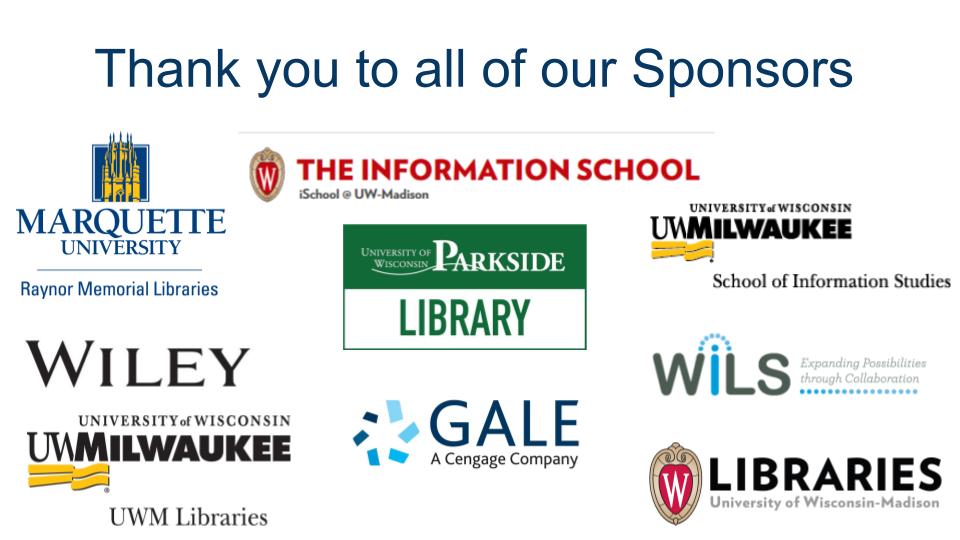
List of Sponsors
Marquette University Raynor Memorial Libraries
University of Wisconsin-Madison - Libraries
University of Wisconsin-Madison - The Information School - iSchool @ UW-Madison
University of Wisconsin-Milwaukee - School of Information Studies
University of Wisconsin-Milwaukee - UWM Libraries
